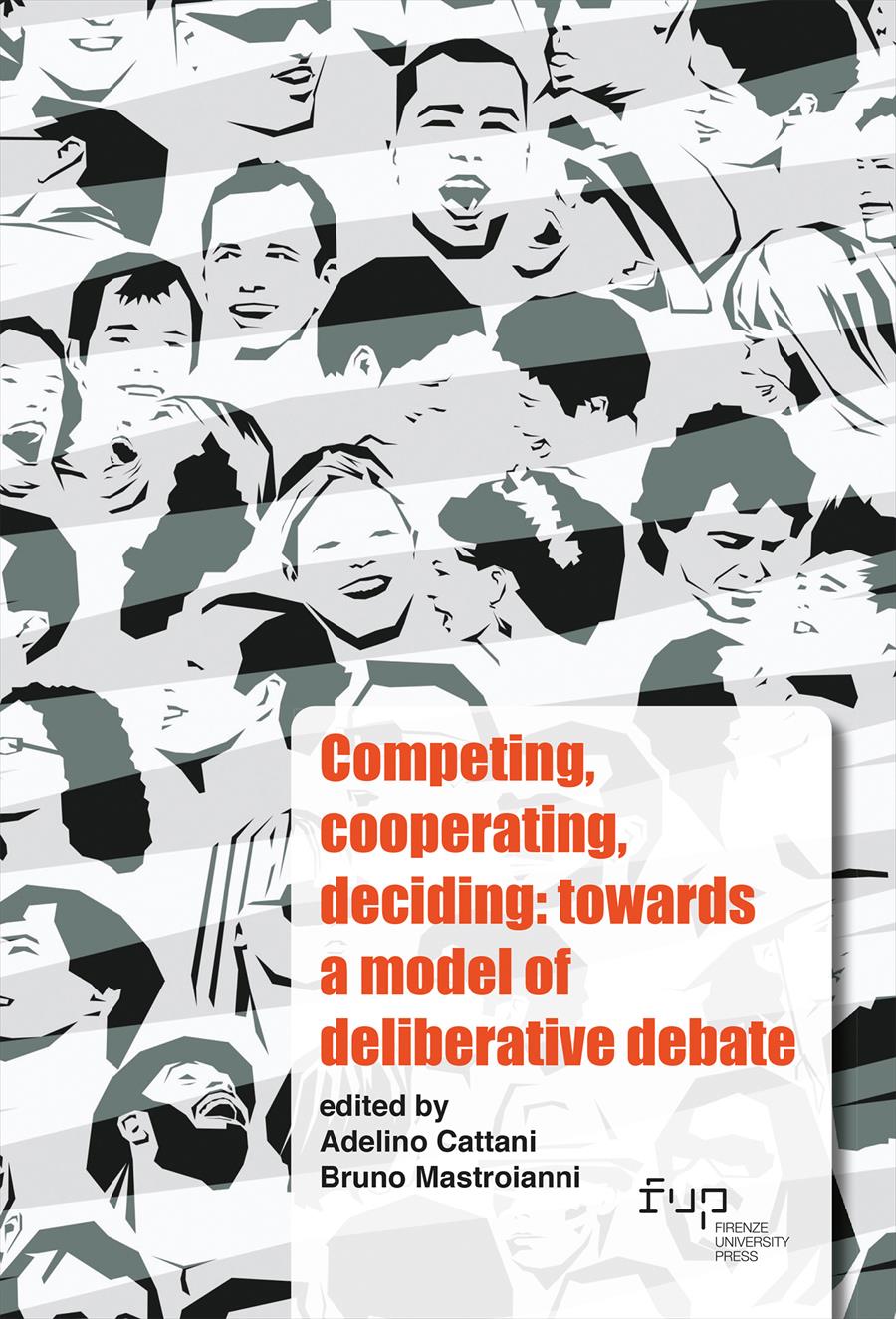- Competing, cooperating, deciding: towards a model of deliberative debate
- Edited by Adelino Cattani, Bruno Mastroianni
Online Critical Debate Model: Deliberation for the Digital Age
- Claudio Fuentes Bravo
- Julián Goñi Jerez
- © 2021 Author(s) |
- CC BY 4.0
- DOI: 10.36253/978-88-5518-329-1.08
Through our experience during a large-scale public engagement exercise in Chile we draw conclusions to adapt and improve the Critical Debate Model to an online format. We highlight the importance of epistemic opposition and structured annotation for the execution of debates, while also exploring the possibilities of automated analysis using Natural Language Processing. We conclude by describing how an online version of the Critical Debate Model could be implemented.
- Keywords:
- Online Debate,
- Deliberative Debate,
- Critical Debate Model,
University of Chile, Chile
Pontifical Catholic University of Chile, Chile
- Billig, M. 1996. Arguing and thinking: A rhetorical approach to social psychology. Cambridge: Cambridge University Press.
- Chambers, S. 2003. “Deliberative Democratic Theory.” Annual Review of Political Science 6 (1): 307-326. DOI: 10.1146/annurev.polisci.6.121901.085538
- Chilvers, J. 2008. “Deliberating Competence.” Science, Technology, & Human Values 33 (2): 155-85. DOI: 10.1177/0162243907307594
- Curato, N., J. S. Dryzek, S. A. Ercan, C. M. Hendriks, and S. Niemeyer 2017. “Twelve Key Findings in Deliberative Democracy Research.” Daedalus 146 (3): 28-38. DOI: 10.1162/DAED_a_00444
- Dryzek, J. S. 2002. Deliberative democracy and beyond: Liberals, critics, contestations, Oxford: Oxford University Press.
- Dryzek, J. S., and S. Niemeyer. 2006. “Reconciling Pluralism and Consensus a s Political Ideals Arguments for Consensus.” American Journal of Political Science 50 (3): 634-49.
- Elstub, S., and O. Escobar. 2019. “Defining and typologising democratic innovations.” In Handbook of Democratic Innovation and Governance, 11-31. Edward Elgar Publishing. DOI: 10.4337/9781786433862.00009
- Escobar, O., and S. Elstub. 2017. “Forms of mini-publics: An introduction to deliberative innovations in democratic practice.” Research and Development Note 4: 1-14. Australia: New Democracy Foundation, Royal Exchange.
- Freeley, A. J., and D. L. Steinberg. 2013, Argumentation and debate. UK: Cengage Learning.
- Fuentes, C., and C. Santibáñez. 2011, “Diseñando debates: preliminares para un enfoque dialógico y crítico.” In Argomentare le proprie ragioni. Organizzare, condurre e valutare un dibattito, ed. A. Cattani, 111-37. Casoria (NA): Loffredo University Press.
- Fuentes, C. 2011. “Elementos para o desenho de um modelo de debate crítico na escola.” In Argumentação na escola: o conhecimento em construção, eds. S. Leitão, and M. C. Damianovic, 225-250. Campinas, SP: Pontes Editores.
- Fuentes, C. 2019. “La argumentación, entre pensamiento, democracia y aprendizaje.” Cogency, 11(1–2): 7-11. DOI: 10.32995/cogency.v11i1-2.330
- Kuhn, D. 1991. The skills of argument. Cambridge: Cambridge University Press.
- Landemore, H. 2017. “Beyond the Fact of Disagreement? The Epistemic Turn in Deliberative Democracy.” Social Epistemology 31 (3): 277-95. DOI: 10.1080/02691728.2017.1317868
- Leitão, S. 2000. “The potential of argument in knowledge building.” Human development 43 (6): 332-60.
- Leitão, S. 2008. “La dimensión epistémica de la argumentación.” In Ciencias de la mente: aproximaciones desde latinoamérica, eds. E. Kronmiiller, e C. Cornejo, 89-119. Santiago, Chile: J. C. Sáez Editor.
- Martí, J. L. 2017. “Pluralism and consensus in deliberative democracy.” Critical Review of International Social and Political Philosophy 20 (5): 556-79. DOI: 10.1080/13698230.2017.1328089
- Niemeyer, S. 2011. “The Emancipatory Effect of Deliberation: Empirical Lessons from Mini-Publics.” Politics & Society 39 (1): 103-40. DOI: 10.1177/0032329210395000
- Niemeyer, S., and J. S. Dryzek. 2007. “The Ends of Deliberation: Meta-consensus and inter-subjective rationality as ideal outcomes.” Swiss Political Science Review 13 (4): 497-526. DOI: 10.1002/j.1662-6370.2007.tb00087.x
- Niemeyer, S., and J. Jennstal. 2018. “Scaling Up Deliberative Effects—Applying Lessons of Mini-Publics.” In The Oxford Handbook of Deliberative Democracy, eds. A. Bächtiger, J. S. Dryzek, J. Mansbridge, and M. Warren, 328-47. Oxford: Oxford University Pre DOI: 10.1093/oxfordhb/9780198747369.013.31
- Ropers, N. 2017. Basics of Dialogue Facilitation. Berlin: Berghof Foundation.
- Schecter, D., and B. Sullivan. 2018. “Beyond Mini-publics Alone.” Research and Development Note 4: 1-4. Australia: New Democracy Foundation, Royal Exchange.
Chapter Information
Chapter Title
Online Critical Debate Model: Deliberation for the Digital Age
Authors
Claudio Fuentes Bravo, Julián Goñi Jerez
Language
English
DOI
10.36253/978-88-5518-329-1.08
Peer Reviewed
Publication Year
2021
Copyright Information
© 2021 Author(s)
Content License
Metadata License
Bibliographic Information
Book Title
Competing, cooperating, deciding: towards a model of deliberative debate
Editors
Adelino Cattani, Bruno Mastroianni
Peer Reviewed
Number of Pages
168
Publication Year
2021
Copyright Information
© 2021 Author(s)
Content License
Metadata License
Publisher Name
Firenze University Press
DOI
10.36253/978-88-5518-329-1
ISBN Print
978-88-5518-328-4
eISBN (pdf)
978-88-5518-329-1
Series Title
Communication and Philosophical Cultures. Researches and Instruments
Series ISSN
2975-1152
Series E-ISSN
2975-1233
